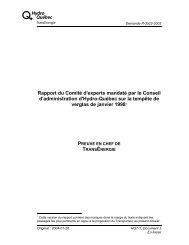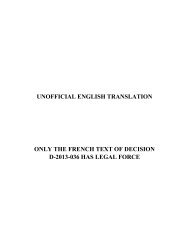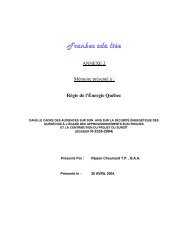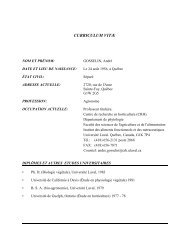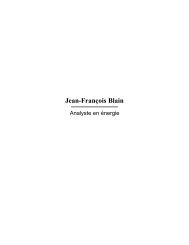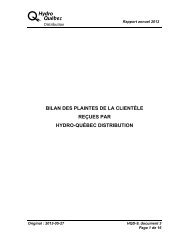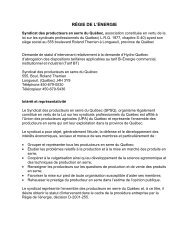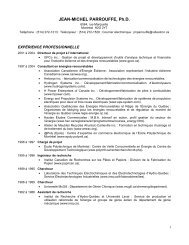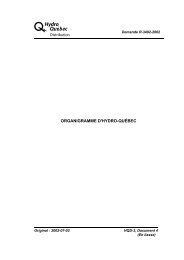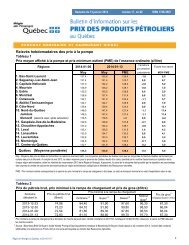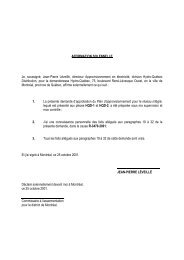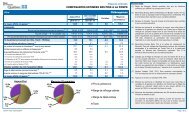The Inevitable Disclosure Doctrine:
The Inevitable Disclosure Doctrine:
The Inevitable Disclosure Doctrine:
You also want an ePaper? Increase the reach of your titles
YUMPU automatically turns print PDFs into web optimized ePapers that Google loves.
<strong>Inevitable</strong> <strong>Disclosure</strong> <strong>Doctrine</strong>Octobersure doce. PepsiCo, Inc v. Redrrnd ment wi inevitably lead hi to rely on a long-stdig public policy agt noncompeteagreements exists in the lawwhich was decided in 1995 and is the the plaitis trade secets.leading case applying this doctrine, involveda rivalry between PepsiCo and evitably diclose or miappropriate trde cause it crate an afr-the-fact covenant<strong>The</strong> cour found that Reond would in-which favors rejecon of the doce beQuer Oats for the sport dr market. secets , ageeing with Pepsico that " Redmondcaot help but rely" on PepsiCo ageed.not to compete to which the pares neverDefendant Redmond began workig forPepsiCo in 1984. When he joined the company,he signed a confdentiality agree-Thus, "PepsiCo fids itselfin the position with these public policy factrs in decid-trade sects whie worki for Quaker. Colorado courts will have to grapplement but he did not sign a noncompete of a coach, one of whose players has left ing whether to apply or reject the doctre.<strong>The</strong>refore, Colorado employers whoageement.playbook in hand, to join the opposingAfer ten years at PepsiCo, Redmond team before the big game.bee "20want to invoke the proteons of the doctreto prote their trade secets shouldgeneral manager of the business <strong>The</strong> cour alo found evidence tht Remondand Quaker intended to use Pepsi-addrss each of those factrs in an apprount covering Calforna that accQuntedfor 20 percent of PepsiCo s profit for the s trade secrets, includig Redmond' priate maner.Unite State.1 Redmond's high position lack offortghtness and Quaker Oats'in the company gave hi accs to inide unnatural interest" in hiring PepsiCoinformation, including: (1) PepsiCo s nationaland regional marketig and fian-appropriate to prote PepsiCo s trade se-In light of the competing interests atemployee. 21 <strong>The</strong>refore , an injuncton wasDivision Among the Courtscial strategies for the upcoming year; (2) crts.ste, it is not surri tht thos courthe company's plan for spec makets;<strong>The</strong> PepsiCo decision was signficant that confonted the issue are dividedand (3) PepsiCo s plan of attack for incringits sha in the sport dr mar-noncompete agreement. Although cour doctre at al and, if so, under what ci-because the pares had not executed a whether to apply the inevitable diclosurket.prior to PepsiCo had applied the inevitabledisclosure docte to enjoin an themselves of the doce wi want to recutace. Employers who wih to avaiIn 1994, without informing PepsiCoRedmond began negotiating for employmentwith the sports drink division of they rarly did so in the absence of an ex-doce where pares seekig to avoidemployee frm workig for a competitor, ly heaviy on caes that have endorsed theQuaker Oats. Redmond ultimately accepteajob offer frm Quaker Oats to berejecd or lited the doce. A dicuspressnoncompete ageement.its application wi rely on caes that havecome Vice President-Field Operations ofsion of both categories of caes follows.the company's sport dr diviion. However,Reond inormed hi PepsiCo su-<strong>The</strong> inevitable disclosure doctne ap-Courts Applying the DoctrneCompeting Policy Interestspervors that he had accpte an offer to plied in PepsiCo implicates stakly competigpublic policy interests. <strong>The</strong>re are cut in PepsiCoFollowig the lead of the Seventh Cir-become Quaker s Chief Operating Offcer.Shorty therer, PepsiCo fied a diversitysuit agt Redmond and Qu-the docte. Fist, employers have an apparently have embrace the inevitableseveral factrs supportg 26 several state, includigapplication of Iowa, Pennylvana, and Nort Carliaer Oats, seekig to enjoin his employment interet in incentivizi and prote innovationsdeveloped thugh substatial ples of some of the caes that endorsed thedisclosure docte. Following are exa-at Quaker Oats.In the Ilois ditrct cour, PepsiCo arguedthat Reond would inevitably dis-socety has an interest in protectg trde Iowa: In Barilla America, Inc. v.investments of tie and capita. Second doce.close the trade sects he acquied whie sects so that businesses wi purue futherinovations and the public wil conagerat Barilla s production facilty inWriht 29 the defendant was a plant man-employed at PepsiCo, inasmuch as hisnew position gave him substatial input tinue to benefit from advances in medicieteology and other fields.24 Th dentiality agreement or a noncompeteAmes, Iowa. Wright did not sign a conf-on the marketig of Quaker Oats's sportdrnk prouct. <strong>The</strong> defendants argued society also has an interest in promotig agreement when he joined the company,that Redmond would be responsible for and mata stdar of commercal even though it was company policy to requiresuch documents prior to employ-implementig Quaker Oats' prexitig ethcs and fair dealng. Fially, both thebusiness plans; therefore, any special UTA and Restatement of Unfair Competitinpermt cour to re thatened exposed to an extensive amount of thement.so Whe' employed atBara, he wasknowledge of PepsiCo s strategies wouldbe irelevant. <strong>The</strong> defendants alo note miappropriation of trade sect inormationcludigdetailed techncal and fiancialcompany's proprietary information, in-that Reond had signed a confdentialtyagreement that prohibited the disclosureof any trade secrets or confdential favor rejecton of the inevitable disclosur ed workig for Barla, Wright tendered<strong>The</strong>re alo ar policy justications that inormation. 31 Five month afr he stainformation. Nonetheless, the court docne. Fit, employees have an interestin marketing their most valuable ducton maner for AI, one of Barahis resignation and accpte ajob as proagreed with PepsiCo and enjoined Redmondfrom working at Quaker Oats. skis, knowledge, and experience. 26 Secmain competitors.<strong>The</strong> defendants appealed.ond, employers have an interet in obtaintaente labor and us spec exp grphs, and notes when he left Bara.32 He retaed a numberof confidential documents, photo-<strong>The</strong> Seventh Circuit Cour reviewedthe Ilois Trde Sects Act and relevant rience and talents avaiable in the workforce.Third, society has an interest quested a preliar injuncton to pre-Bara sued Wright and AIC and re-cae law. <strong>The</strong> cour concluded thata plaintiff may prove a claim of trade fosteri competition to encour fuer vent Wright from workig for AIC. Barilaargued that it was entitled to an in-secret misappropriation by demonstratigthat defendant's new employ-and servces in the maketplace. Fialy, juncton becuse Wright would inevitablyinovation and reduce the costs of goo18/ <strong>The</strong> Colorado Lawyer / October 2004 / Vol. 33, No. 1 0
<strong>Inevitable</strong> <strong>Disclosure</strong> <strong>Doctrine</strong>Octoberdisclose its trade secrets to his new employer.54 <strong>The</strong> distrct cour ackowledgedthat the inevitable disclosure doctrine"has been used as a vehicle for showingthat an injuncton is necsar to preventthe miappropriation of trade secets. "35Because Iowa s trade secrets act authorizedcour to enjoin actal or theatenedmiappropriation, the Barilla cour concludedtht the doce was ' us one wayof showing a threatened disclosure. "36(Emphais add.Acc tothe Barilacour, to invokethe inevtable disclosur docean employer must prove not only thatthe employee had access to or knowledgeof trade secrets and that the dutiesof his or her next job overlap withthe duties of his or her previous job, butthat he or she would be able to rememberthe trde sect inormtion in a usableform.<strong>The</strong> testiony before the cour faied toshow that Wright retained any of thetrade secet inormation to which he wasexpsed whie workig for Bara. Nevertheless,the missing physical evidence oftrade seet inormation tht Wright tokwhen he left Bara convinced the courthat a legitiate that of disclosure existed.<strong>The</strong> cour found that the missingphysical evidence "weigh(ed) againstWright' s credibilty and in favor of a nefarousintent"38 and tht there were "simplyto may indications tht Wright mayuse this inormation to fuher his positionat AIC. "39 <strong>The</strong>refore , the cour enjoinedWright from workig for AIC orany other competitor of Barilla for approxiatelyone year.4OPennslvaniaCos. v. Erwin Pearl, IncIn a 2000 cae Hyman41 a Pennylvanaditrct cour considered whether to enteran injunction prohibiting an attorney,Brozost, from representi the plaitiscompetitor in lease negotiations. Aferworkig as the plaitis general counelfor several years 42 Brozost had becomeemployed by the defendant companies.<strong>The</strong>re, he performed the same job dutiesand responsibilties for them that he hadperformed for the plaiti as its generalcounsel. 43 Accordig to the plaintiff thelease negotiations would requie hi inevitablyto use or disclose the plaitiffstrade set inormtion.<strong>The</strong> cour found that Brozost had "acquiedsigncat and detailed informationregarg (the plaitis) operationsin the. . . years he was employed. "44 Althoughmost of th inormation was "generaknowled," the cour found that Brozos alo had acqui "spec knowled. . . with respe to the lease negotiationswhich he had undertaken on (the plaitis)behal" tht was "properly clasiedas confdential and proprieta inormation.<strong>The</strong> cour alo found that Brozost oweda fiduciar duty to the plaiti and had aduty not to use or disclose its confdentialand proprieta inormation to the plaiti's diadvanta. 46 <strong>The</strong> cour note thateven in the absence of a restrictivecovenat, a former employer ca enjointhe competitive use of confdential informationobtained as a result of thetrust and confdence of a former employment.Accrdly, the cour issued a permentinjuncton preventi Brozost frm representing the defendants in competingtranactons with the plaitiff and fromdisclosing the plaintiffs trade secret information.In a 2004 cae Doebler's PennslvaniaHybri Inc v. Doebler Seeds, LLC 49 theTh Cirt Cour predict that Pennsylvanawould apply the inevitable disclosurdocte based on a state superiorcour cae Air Pruc Chemical Incv. Johnson. 5o In Air Products ChemicalInc the Pennlvana Supeor Courrestrained an employee from disclosingconfdential inormtion to a new employerand parcipatig in cert aspechis new job because of the risk of disclosure.51 <strong>The</strong> Doebler court therefore upheld,under Pennylvana law, an injunctionpreventig the appellants from competiwith their former employer, despitethe fact they had not signed noncompeteageements, becuse they used their formeremployer's "own confidential informationto compete. "52North Carolina: In Merck Co. v.Lyon 53 a federal cour in Nort Carliaenjoined a former employee frm workigon a specic product made by the plaitiscompetitor. <strong>The</strong> cour held thatNorth Carolina would enjoin threatenedmisappropriation based upon aninevitable diclosure theory where theinjunction is limited to protectingspecificaly defined trade secrets, butthe trade secret wi have to be clearlyidentied and of signcat value.Accordig to the cour, an employer couldprove a "likelioo of diclosur" by showing:(1) the degree of simlarty betweenthe employee s former and curent position;(2) the value of the inormation; (3)the degee of competition between the formerand new employer; (4) the new em-pI oyer s effort to safeguard the formeremployer's trade secrets; and (5) the formeremployee s lack of forthrightnessboth in hi or her actvities before accptingthe job and in his testimony. 55 Afrreviewig these factrs, the Merck courconcluded tht the defendat was liely tomisappropriate his former employertrade sects and, thus, an injuncton wasappropriate. 56Courts Rfdecting orLimiting the DoctrneLower courts in California, FloridaMichga, New York, and VIra have eitherrejecd or severely lite the applicationof the inevitable disclosure doctrine.However, the supreme courts ineach of these state have yet to decde theissue.<strong>The</strong> leading CaliforniaCalifornia:cae on the inevitable diclosur docemay be a 1999 cae Bayer Corp. v. RoheMolecular Systems. 57 In that cae, Betzelosquit his job as a marketig managerfor Bayer and accpte a simar positionwith a competitor, Roche. <strong>The</strong>reuponBayer intitute legal acton and requesteda preliminary injunction againstRoe.In rug on the injuncton, the distrctcour state that it was ''lely that Bayerwill prove all the elements of its tradesecretscae but one:actu or threateneduse or disclosure. "58 (Emphais add.:f th gap, Bayer tred to invoke the inevitabledisclosure doctrine by arguingthat the diclosur of its trde sects wasunavoidable, because Betzelos inevitablywould use them in his new job withPepsiCoRoe. 59 <strong>The</strong> cour dicussed thedecision and note that the docte "allowsplainti employers to demonstratethatened miappropriation without evidenceof an employee s intent to diclosetrade sects.''6Nevertheless, the court flatly rejectedadoption of the inevitable diclosure doctre.Ind, the cour held tht "Calorniatrade-secrets law does not recognzethe theory of inevitable diclosur. "61 Sucha theory the cour reasoned, would be inconsistentwith the state' s strong publicpolicy in favor of employee mobilty andagait covenants that restrct such mobilty62<strong>The</strong> inevitable diclosur doceessentialy creates an afr-the-fact noncompeteagment. <strong>The</strong>refore, in Calornia,a trde-sects plaiti must show anactual use of trade secrets or an actualthat ofmiappropriation. 63 Bayer couldnot make this requisite showing, so its20/ <strong>The</strong> Colorado lawyer / October 2004/ Vol. 33, No. 1 0
2004 <strong>Inevitable</strong> <strong>Disclosure</strong> <strong>Doctrine</strong>motion for a preliar injuncton wasdenied.FlriA federa cour in Florida refusedto apply the inevitable disclosuredoce in Del Mont Frsh Pruc CaDole Food CO. In ths cae Fu was aSenior Vice-President in charge ofResearchand Development for Del Monte.He signed a confdentiality agreementwith Del Monte, but never signed a noncompeteagment. Afr sin yeaservce Fu resigned and went to workfor Dole as Vice-President of Qualty Assurance.Del Monte subsequently suedDole and Fu and moved for a prelinarinjuncton to prevent the defendantsfrom miappropriatig its trde secets.<strong>The</strong> Del Monte cour bega its analysisby noti tht the UTSA provides for onlytwo ty of mippropriation: act andthtened. However, the cour obsrvedsome cour had "derived a thd tyeinevitablediclosurmiappropriation. "68Del Monte reuested an injuncton basedon the theories of threatened and inevitabledisclosure. Thus, the cour procededto analyze the sufciency of thesetheories.<strong>The</strong> cour had litte diculty in diposingof the inevitable disclosure doctre.Afr reviewig the caes supportg thetheory the cour note tht Calorna andFlorida (the two states' laws involved inthe cae) had neither adopte the docenor cited PepsiCo with approval.<strong>The</strong>refore accrd to the cour tht theorycould not be relied on to provide therequested relief. Intead, the cour heldthat(a)bsent evidence of actual or threatenedmisappropriation, a cour shouldnot allow a plaintiff to use inevitablediclosure as an afr-the-fact noncompeteageement to enjoin an employeefrm worki for the employer ofhi orher choice.In so holding, the cour interpreted theUTSA to require that a plaintiff provetheatened miappropriation of trade secretsby some means other than the inevitablediclosure doce.<strong>The</strong> Del Monte cour alo found that nothreatened disclosure had been shown.<strong>The</strong> plaiti had demonstrated only thatFu posessed company sects. Howev-, there was no evidence that he tookdocuments or confdential informationwith him when he left Del Monte " andthere was "no evidence that he made aneffort to take such information. "73 AlthoughFu had extnsive knowledge ofDel Monte' buses operations, the courbelieved Fus tetiony that he couldnot recall this information with precision.74 <strong>The</strong>se factrs led the cour to concludethat there was no theat of miapproprition.Michian In Leach Ford Motor CaMich cour was asked to isue an injunctonto prevent a former Ford executivefrm accpti a poition with Fit , arival car manufacturer. <strong>The</strong> executiveLeach, had ben with Ford for moretwenty-five year and was bound by bothconfdentiality and noncompete agreements.<strong>The</strong> lattr did not apply if Leachwas involuntarly terminated from thecompany. 77 Althoug there was confctevidence as to whether Lech reigned orwas involuntary termated, Ford contendedthat the inevitable disclosure oftrade secets should prevent Leach fromjoin Fiat, even if he was involuntaytermted.JOHN A. CRISWELLARBITRATION AND MEDIATION SERVICESMADEN &MADENAttorneys & Counselors at LawPractice limited toLitigation and Dispute ResolutionLABOR AND EMPLOYMENT DISPUTES- Senior Judge, Colorado Court of Appeals- 25 years' experience in prosecuting anddefending employment claims- Hearing Offcer for Denver Civil Serviceand Colorado Judicial Department- American Arbitration AssociationEmployment Arbitrators Panel1045 Lincoln Street, Suite 201Denver, Colorado 80203Tel: 303-864-1664Fax: 303-837-1622E-mail: CRISWELL1956 OL.COMJOHN W. MADENJOHN W. MADENAccepting referrals andrequests for co-counsel410 17th StreetSuite 530Denver, Colorado(303) 436- 1111<strong>The</strong> Colorado lawyer / October 2004 / Vol. 33, No. 1 0 / 21
, ", "<strong>Inevitable</strong> <strong>Disclosure</strong> <strong>Doctrine</strong>October<strong>The</strong> court disagreed with Ford's contention.<strong>The</strong> court noted that the Pepsidecionreste in signcant par on the lowercour's determation that the formeremployees conduct evidence a lack ofcandor, and proof of his wingness tomisuse trade sects.<strong>The</strong>re was no such evidence in the Leachcase. Furthermore, the court cited aMichga Cour of Appeal cae tht stat-, in dicta that the concept of inevitablediclosur must not compromie the rihtof employees to change jobS. <strong>The</strong>reforethe Leach cour refued to apply the inevitablediclosur doce based on thefacts presented. Instead, the cour enjoinedFord frm makg any statementsclaimig that Leach was precluded frmaccepting employment with any Fordcompetitors.New York: Decisions from New Yorkcours initially seemed to indicate thatNew York would apply the inevitable diclosuredocte. For exaple, in a 1997cae DoubleClick, Inc v. Hendrson 84 theSupreme Cour of New York for New YorkCounty enjoined two executives whoworked for DoubleClick frm launchg aJacqueline St" Joanit SpeiaiAdvoc forCbildren* Parnting Coordinator. Mediato - Arbitrltor* P'dvate JudgeExperiene .Interdisciplinary .Affrdable ,.Locm ltldme ....c11'I.ell. JoB -IUffle., at Law..1.$n$uluao tlnmCOPmr.(mm.at82 fuqa932,fGOWW.5p""kmvocat.new business or working for Double-Click' s competitors for a period of sixmonth. 85 Among oter th, the Double-Click cour noted: (1) a high probabiltythat the exectives would inevitably disclosetrade secrets; and (2) the "defendants'cavaler atttude towar their dutiesto their former employer. " 86However, subsequent decsions have indicatetht the inevitable disclosure doctrinemay be applied in New York onlyrarely. In a 1999 case Earth Web, Inc v.Schlack s7 a New York distrct court refuedto issue a preliar injuncton toprevent an EarWeb employee from acceptiga poition at a competitive company.83 Ear Web ared inter alia tht theinevitable dilosur doce provided anindependent basis for issuance of the injuncton.<strong>The</strong> cour rejec th arentand, in doing so, establihed a high stadardfor the futue use of the doce.<strong>The</strong> Earth Web cour dicued the DoubleClickdecision and noted that theDoubleClick cae "appear to represent ahigh water mark for the inevitable diclosurdoce in New York"90 Even so, theDoubleClick holdig "rest(ed) heaviy onevidence of the defendants' overt theat oftrde sects and breches of fiduciar duty"cases where there was no evidence of actumisappropriation, cour were beingasked to bind the employee to an implied-in-factrestrctve covenant based onfidig of inevitable diclosure. "92result was inconsistent with New York'sstrong public policY agaist such agreements.<strong>The</strong>refore accrd to the Earth-Web cour the inevitable diclosure doctretreads an exceedigly narow paththugh judicialy difavored terrtory "94As such, the cour concluded that the doctrneshould be applied rarely if there isno evidence of actal miappropriation bythe employee.Following Earth Web in a 2003 caseAccordg to the Earth Web cour, inColoniz. com, Inc v. Perlow 95 a New Yorkfederal ditrct cour refued to apply theinevitable disclosure docte. <strong>The</strong> cournoted that the docte "is disfavored inNew York because of the State's strongpublic policY agait retrctve non-competitionagreements"96 and, therefore, isto be used "very sparly to grant injunctiverelief only in circumstances whereother evidence of theft of trade secets exists."97 <strong>The</strong>re was no such evidence in theColonize.comcae, so the cour refued toissue the requested relief. As the courtnoted mere knowledge of the intrcaciesof a business is simply not enough. "98Virginia: In Government TechnologyServices, Inc. v. Intellsys TechnologyCOrp. 99 a Virgia state cour grante thedefendant' s demurrer on the plaintiffsclai for breach of a confdentialty andnondiclosur agment. In tht cae, theplati ared tht there would be an inevitabledisclosure of confdential information.l00 In grantig the demurer, thecour held that an alegation of inevitabledisclosure was insufcient to support aclai for brech of confdentialty Indthe plaiti had "to alege diec or indirectdisclosure of any confdential information."101 Ths decision implicitly suggeststhat VIra cour may not recognizethe inevitable diclosur docte.Protecting Trade SecretsWithout the <strong>Doctrine</strong>:Practice TipsAlthoug cour in several jurdictonsseemingly have rejected the inevitabledisclosure doctrine, it appears that thedoce has a legtite place in trde secretla-w parcuarly because the UTSA(which Colorado has adopte) permts injunctonsto prevent threatened misappropriation.l02 Neverteless , given the uncertaitysurundig the doce, Coloradoemployers should take protectivemeasures to guard the privacy of theirtrade sect inormtion.<strong>The</strong> following tips, suggested by thecae law in th ara, should help employersprotect their valuable trade secretsand confdential inormation when a formeremployee join a competitor. <strong>The</strong> fitgroup of tips involve agreements withand obligations of; the company's employees.<strong>The</strong> second group descrbes actionsemployers ca tae to mize the riskof trade secet forfeitu.Employment Agreements forProtecting Tr SecretsAs noted above, the inevitable disclosuredoce essentialy crates an afrthe-factnoncompete agment for whichneither the employer nor the employeespecifically bargained. Thus, the surestway to avoid havig to rely on the doceis to enter into a noncompete ageementup front-at the begig of; or at leastdurg, the employment relationship. Althoughit still may become necessar tolitigate the enforceabilty of the noncompeteageement, a cour is more likely toenforce a negotiated ageement than toimpose one that was not negotiate at al.22 / <strong>The</strong> Colorado lawyer / Ocober 2004 / Vol. 33, No. 1 0
, "2004 <strong>Inevitable</strong> <strong>Disclosure</strong> <strong>Doctrine</strong>Followig is a discussion of thee agreementsemployers should consider obtaingfrom employees with access to tradesecrets: (1) noncompete ageements; (2)nonsolicitation ageements; and (3) confdentialtyageements.Noncompete Agreements:From theemployer's perspectve, every employeewho wi be given access to trade secetsidealy should sign a noncompete ageementbefore he or she begi worki forthe company. As the Earth Web cour not-Clealy, a wrttn agment tht contaa non-cmpete clause is the be wayof promoti prectbilty dur the employmentrelationship and afrwar. "103Although noncompete ageements aregeneraly prohibited by Colorado statutethat same statute permts noncompeteageements for the proteon of trde secrets,as long as the agreements are notbroader than necssar to protect the legitimateinterests of the employer.104 Inaddition, there are exceptions to the generalrue prohibiting noncompete ageementsin Colorado if they are contractsfor: (1) the sale or purchase of a business;105 (2) recovery of certain trainingl06 and (3) execu-Nonsolicitation Agreements:and education expenses;tive and management personnel, as wellas professional sta to maagement personnel.l07Becausenoncompete agements ar generalyprohibited by Colorado statute, anddesite the exception for contrac for theproteon of trde sects, a Colorado employerseekig to prote tre sects aloshould consider havig its employee executea foced and nawly taored nonsolicitationagreement. Such an agreementshould be simar to the nonsolicitationagement enforcd in ManaementRecruiters of Bouldr, Inc v. Miller. IOBIn Miller the Colorado Court of Appealsupheld a nonsolicitation provisioninvolving an employee, Miller, who hadworked fora rectment agncy <strong>The</strong> employeewas retrct frm contactg, onbehalf of his new employer, any candidateswith whom he had contact durthe last yea ofhi employment. 109 Due tothe presence oftrade secrets, the courconcluded that the provision was necessaryto safeguard the plaintiff' s business.110 <strong>The</strong> court also found that theterm were reaonable in their effec andtailored to prevent the miappropriationof trade secets by Mier. "11Confidentiality (Nondisclosure)Agement Employers concerned abuttheir trade secrets also should have allemployee with accs to them sign a confidentialtyor nondiclosur , ageement.<strong>The</strong> agreement should make clear thatthe employee may never use or disclosethe employer's trde sect inormationanyone, and must return any physicalcopies of such inormtion to the employerimmediately on termation of employment.Because noncompete ageementsbe enforc oruy to the exnt necarprotect trade secrets under CRS113(b), there is some rik tht a cour considerigthe enforceabilty of a noncompeteageement may fid it unecessarin light of the confdentialty ageement.However, there is perhaps a grater rik acour would conclude there are no tradesecrets to begi with if the employer didnot have its employee execute confdentialtyagements to prevent their diclosure.Other Ways to SafeguardTr SecretsIn addition to having employees executeemployment agements for the protection of trade secrets, employers cantae a varety of other actons to lit andcontrl the diemition strag, and exposureof confdential inormation, bothwith and outside the organzation. Followigare some suggestions employerscan follow to mize the risk of losingtheir trde secets. Employers should:. Grat ac to highy confdential informationon a strct "need-toknow"basis. Give employees who need access tosuch inormtion password or accscodes that other employees do nothave. Periodically change passwords andreset accss. Not dissemiate highly confdentialinormtion to any th pares, possiblyincludig independent contractorsl12. Mark highly confdential docuentsappropriately and never store themon unec back-up diks113. Consder mata confdential informtionin a "sec clte relatevault that (is) accsible oruythose who kn(o)w the combination "114. Consider implementi reguar procedur to safeg confdential material,such as distributing contactlists on a weekly basis, precludingemployees from sharng their listswith coworkers collec the lisome point in the futu, and shreddilits on a reguar basis 115. Consider holdi trai programfor their employees, emphasizingways to safeg privac of trde secrtinormtion. Addrs the importce of safegingthe employer s trade secrets intrai and policy maua. Conduct Internet searches for unauthorizedwebsite postigs by formerand cunt employee. Pre-approve aricles and presentationsgiven to outsiders, as well asany public anouncements about thecompany. Although it sounds obvious, refrainfrm givi public tour of their facities,especaly to the company's competitors116. Consider notifyng employees thatunauthorized disclosure of trade secrtsis grunds for imedate termnation. Upon termnation, ensure that thedeparg employee retu al confdentialinormtion and is remidedAchievement: Accomplishing successfully through skil & perseveranceYou develop the legal strategy - we provide the medical record foundationVisitOur proudest achievement - earning your confidenceConsultantsfor MedicalDirection,Meg Dunlop RN and Jeannie Stenson RNCMD Legal Nurse Consultants 303.693.9991www.uslegalnurses.com for our complimentary offer<strong>The</strong> Colorado lawyer / October 2004/ Vol. 33, No. 10/23
, ", "); "). );).);of his or her obligations under thevarous agments dicused above.Employers are not reuied to adopt alor even most of these measures to seektrade secret protection from the cour.Colorado cour do not impose a stadarof perfecton or uneasonable expense.Each case is fact-specific and must beviewed in context. Nevertheless, an employershould tae reasonable steps andmeasurs to prote its trde sects andif it doe so, it may never nee to rely onthe inevitable diclosure doce.Conclusion<strong>The</strong> inevitable disclosure doctrinewould seem to be proper as long as it issomewhat naIwly constred. <strong>The</strong> caesdiscused in th arcle suggest dierentways the cour have reached th result.Under the stct of these caes, employershave been required to present evidenceof actual misappropriation orthatened miappropriation of confdentialinormation or trade secrts. 118 Employersalo have ben reui to preentsome evdence oflack of cador by the employeeor apparent wigness to miusethe former employer's trade secretsotherword, a ''nefarous intent."119Some cour have required employersto demonstrte that the employee not onlyhad acs to trade secets, but that heor she would be able to remember thetrade secret information in a usableform. l20 One commentator has sugestethat employers should show that it is inevitablethe employee wi use a specictrade secret in the course of performngan identied job reponsbilty inerent inthe employee s new position. 121Employers who seek to avail themselvesof the inevitable diclosure docein Colorado should be mindful of thesefactrs and demonste their presence tothe greatest extnt possible. Conversely,employers and employees seeking toavoid application of the docte shouldshow that these "inevitabilty-plus requiments"ar absent and, therefore, theinevitable disclosur doce should notbe applied.Abve al, every employer should avoidthe need to rely on the inevitable disclosuredoce if possible, by ta measuresto protect their trade secrets beforetheir employee defec to competitors. Althoughthere is no perfec way for a companyto guarantee that its trade secetswi remai private and sec, the tips inth arcle provide a good stag point<strong>Inevitable</strong> <strong>Disclosure</strong> <strong>Doctrine</strong>for proteg trde sects at the sour.In addition, they buid a solid foundationto support a claim for injunctive reliefbased on the inevitable disclosure doctre,should an employee decide to 'jointhe oppo te before the big gae. "122NOTES1. See, e.g., Del Monte Frsh Produce Co.Dole Foo , 148 F.Supp.2d 1326, 1335 (S.Fla. 2001) (In an inevtable diosure cascour ca issue an injuncton to prvent an employeefrm worki for the fonner employer'scompetitor if the employer ca demonsate areal and preent dager of diclos.2. PepsiCo, Inc 54 F.3d 1262 (7th Cir 1995).3. See Unionn Trade Sets Ac ("UK)2(a) (1990) ("(a)ctal or thatened miappropriation may be enjoined"4. Notably, Colorado ha adopted the UTA,includig the proon authorizig injunctverelief to "prevent or restrai actal or threatenedmiappropriation of a trade secrt. (Emphaismkd.) CRS 74-103. Under th ColoradoUTSA, "trade secrets" are "the whole orany porton or pha of any scentic or tecainonntion, desgn, prss, prour, formula,improement, confdential busess or financialinonnation lig of naes, addrses,or telephone numbers, or other inonntionrelati to any buses or profession which issecret and of value. To be a 'trade secret,' theowner thereof must have taken measures toprevent the secet frm bemig avaiable topersns other th those selec by the ownerto have access thereto for limted purposes.CRS 74-102(4).5. See, e.g., BarillaAm., Inc v. Wriht No. 4-02-CV-90267, 2002 US. Dit. LE 12773 at*25 (S.D.Iowa July 5, 2002).6. See Del Monte Frsh Pruce Co., supranote 1 at 1335.7. PepsiCo, Inc, supra note 2.8. Interestingly, PepsiCo, Inc. and QuakerOats merged. in 2001. Accordg to a PepsiCostatement Quaker s powerful Gatoradebrand, the world's number one sport drwi make PepsiCo the clea leader in the UnitedStates in non-carbonated beverages. Seehttp://ww.pepsico.comlinvestors/annualreport2000/quaker.shtInl.9. PepsiCo, Inc, supra, note 2 at 1264.1OId.11. Id. at 1265.12. Id.13. Id. at 1264.14. Id. at 1265.15. Id. at 1266.16. Id.17. Id. at 1272.18. Id. at 1269.19. Id. at 1270.20. Id.21. Id. at 1271.22. See, e. , Eastman Kodak Co. v. PowersFilmPr 189AD. 556 (N.Y.1919).October23. See, e.g., Colonize.com v. Perlow No. 03-CV-466 2003 US. Dist. LEXS 20021, at *9,*13, *15 (N. Y. Oct. 23, 2003) ("A covenantnot to compete in an employment settg wibe specificaly enforceable only to the extntthat it is alo necessar to prote employer'slegitite intere, not ha to the geeralpublic and not uneasonably burdensome tothe employee.(Intern quotatins omittd.24. See BarilaAm, Inc, supra note 5 at *33(S.D.Iowa July 5, 2002) ("Te public interes inproteg valuable trade sects is embodiedand arculate in the Iowa legislatu's passageof the Iowa Trade Secrets Act. . . . <strong>The</strong>Cour therefore fids tht the public interest isserved by enjoin the diclosur of trade secrts.(Intern citans and quotans omitted.25. See UTSA 2(a) (1990) (" (a)ctual orthreatened misappropriation may be enjoined"Resttement (Tird) of Unfair Competition44 (1995) ("injunctive relief may beawared to preent a contiui or thateedappropriation of another's trade set"26. See, e.g., Colonize.com, supra, note 23 at*13 ("Rstrctons agt the use by a fonneremployee ofhi acculate exprience, skiappreciation of intangibles and judgment inhi new employment would effecvely barfrm al employment and ar beyond legaliitsand would have to be decar void. CMIInt'l , Inc. v. Intermet Int'l Corp. 649 N.W.2d808 813 CMch.CtApp. 2002) (''Een asumgthat the concept of 'tateed misappropriation'of trade secets encompasses a concept ofinevitable disclosure, that concept must notcompromise the right of employees to changejobs. Bayer Corp. v. Roche Molecular Sys., 72F.Supp.2d 1111, 1118 (N. Cal. 1999) (notigthat courts were reluctant to apply the inevitablediclosure doce "buse of strngpublic policies in favor of employe mobilty"27. See, e.g., Colonize.com, supra note 23 at*13, *15 (the doctrie is disfavored in NewYork because of state s strong public policyagait restrctve noncompete agments);Bayer Corp., supra note 26 at 1119 ("Calorniapublic policy favors mobilty and freedom.);Lafourche Speech Lange Servs. v.Juckett, 652 So.2d 679, 680 (La.App. 1st Cir.1995) (noncompete agrements not favore inLouiiaa and generaly "deemed to be agtpublic policy28. PepsiCo, Inc, supra note 2.29. BarillaAm., Inc, supra note 5.30. Id. at *6.31. Id. at *6-8.32. Id. at *3, *9.33. Id. at *10-11.34. Id. at *21.35. Id.36. Id. at *25.37. Id. at *28.38. Id. at *31.39. Id. at *33.40. Id. at *35.41. Hyman Cos., 119 F.Supp.2d 499 (E.D.Pa.2000).24/ <strong>The</strong> Colorado lawyer / October 2004 / Vol. 33, No. 10
.iA..:m...ofumtS ano. DeuCUesAvalale..ASfred. .A'pnCationP.r4f...S5,o..D:pli...DeChSC'..verm4iFuU;PrJQfA.Ctf..ve.raeAWUabJetoQQalFiJ&kNewletr
").);<strong>Inevitable</strong> <strong>Disclosure</strong> <strong>Doctrine</strong>October42. Id. at 501.43. Id. at 502.44Id. at504n.45. Id.46. Id. at 505.47. Id. at504.48. Id. at 505.49. Dobler Seeds IL 88 FedAppx. 520 (3dCi Feb. 12 2004).50. Id. at 522 n. citing Air Products &Chemicals, Inc 442 A2d 1114 (Pa.Super.Ct.1982).51. Air Products Chemicals, Inc., supranote 50 at 1124-25.52. Doebler Seeds, LLC, supra note 49 at522-23.53. Merc Co. 941 F.Supp. l44 (M.D.N.1996).54. Id. at 1460.55. See id. (citing PepsiCo, Inc, supra note 2at 1267).56. See id at 1460.57. Bayer Corp., supra note 26.58. Id. at 1117.59. Id.60. Id. at 1118.61. Id. at 1120.62. See Cal. Bus. & Prf. Code 16600 (renderignoncompete agrments in the contextof an employment relationship void).63. Bayer Corp., supra note 26 at 1120.64. Id. at 1121.65. Del Mont Frsh Pruc Ca, supra, note66. Id. at 1328.67. Id. at 1335.68. Id.69. PepsiCo, Inc, supra note 2.70. Del Monte Frsh Pruc supra, note1 at 1336-37.71.Id. at 1337.72. Id.73. Id. at 1339.74. Id. See also, e.g., BarillaAm., Inc, supra,note 5 at *28 ("(Ajn employer must prove notonly tht the employee had access to or !mowledgeof trde sects and tht the duties oflror her next job overlap with the duties oflr orprevious job, but tht he or she would be ableto remember the trade sect inormation inusable form.75. <strong>The</strong> Del Monte Frsh Prduce Co. decsionsupra note 1, taes a miority view in analyzgthe inevitable disclosu dQGe as a"t ty" of misappropriation in addition toactal and thatened. Oter cour view theinevitable disclosure doctrine as simply amea of establig thtened miapprpriation.<strong>The</strong> Del Monte decision ha been criticiedas miconsg Florida law, which, unlieCalorna, does not render void noncompeteagreements in the employment contextand, thus, doe not have the strong public policyagainst covenants that restrct employeemobilty See Scer, "Tade Secet <strong>Inevitable</strong>Diclosur: Substative, Predural and PracticalImplications of an Evolvig DoctrieJPS 336, 345 (May 2004).76. Leach, 299 F.Supp.2d 763 (E. Mich.2004).77. Id. at 764.78. Id. at 775.79. PepsiCo, Inc, supra, note 2.80. Leach, supra note 76.81. See id., citing CMI Int', Inc, supra note26 at 813.82. Leach, supra, note 76 at 775.83. Id. at 777.84. DoubleClick, Inc., No. 116914/97, 1997Y. Misc. LES 577 (Sup.Ct. Y.Co. Nov. 7,1997).85. Id. at *23.86. Id. at *16-17.87. EarthWeb, Inc., 71 F.Supp.2d 299(S.D.N.Y. 1999).88. Id. at 303, 317.89. DoubleClick, Inc, supra, note 84.90. Earth Web, Inc, supra note 87 at 310.91. Id.92. Id.93. See id.94. Id.95. Colonize.com, Inc, supra, note 23.96. Id. at *15.97. Id.98. Id. at *16.99. Gov t Tech. Servs., Inc. 51 Va.Cir. 55(Va.CiCt. Oct. 20, 1999).100. See id. at 55.lOUd.102. CRS 74-103.103. Earth Web, supra note 87 at 311.104. CRS 113(2)(b).105. CRS 113(2)(a).106. CRS 113(2)().107. CRS 113(2Xd). Management personnelar thos employee who ar "i ch"of the busess and who actin an unpervmaer.Atml Corp. v. Vitesse SemiconductorCorp., 30 P.3d 789, 794 (ColoApp. 2001); see al-Sf! Mgmt. Recruiters of Boulder, Inc. v. Miler762 P.2d 763, 765 (ColoApp. 1988) ("accountexective " who was priy an "iormationgatherer" was not a manager or executive).Prfessional employees and professional stato maagement have ben defied narwly toinclude "such persns as lega, eneerig, scientificand medical personnel together withjunor professional assistats. Boulder Med.Ctr v. Moore, 651 P.2d 464 (Colo. App. 1982).108. Miller, supra note 107.109. Id. at 766.110. Id.111. Id.112. See Colora Supply Co. v. Stewart, 797P.2d 1303, 1306 (ColoApp. 1990).113. See Storae Tech. Corp. v. Cisco Sys., IncCiv. No. 00-2253 (JNE/JGL), 2003 U.S. Dist.LE 17347 (D.Mi. 2003) at *20-22.114. In re Bass 113 S. 3d 735, 742 (Tex.2003).115. See Netork Telecomms, Inc v. Boor-Crepeau790 P.2d 901, 903 (ColoApp. 1990) (tralcour err in forelosing employer's opportnityto present evidence showig tht its customerli were entitled to trade set protetion).116. See Hildreth Mfg. LLC v. Semco, Inc, 7852d774, 786 (Ohio App. 2003) (inormtiondid not constitute trade secets and thus notentitled to proteon beus inormation "notsubjec to reasnable effort to maita its secrec).117. See Netork Teleomms, Inc, supra note115 at 902 (notig tht "effort to maita secrec ar those tht ar reasonable under thecice and do not reui tht extmeand unduly expnsive proedures be taen toprote trade sets"118. See, e.g., Colonize.com, supra note 23 at*16 ("New York cour have used the docevery spargly to grant inunctve relief only incicutaces where other evidence of theft oftrade secrets exists. see also, e. , Bridgestone/Firestone,Inc. v. Lokhart 5 F.Supp.667 682 (S.D.Ind. 1998).119. Barilla Am., Inc., supra note 5 at *31.See also, e., Leach, supra note 76 at 775 (noevidence of employee s lack of candor or wilingnessto mius trde sets); H&R Block E.Tax Servs. v. Enchura 122 F.Supp.2d 10671076 (WD.Mo. 2000) ("To prevail under thistheory, employers must demonstrate inevitabiltyexits with fact indicatig tht thenatu of the sets at issue and the natue ofthe employee s pas and futue work jus aninference that the employee canot help butconsider set inormation.120. See Barilla Am., Inc., supra note 5 at*28.121. See Shi, '<strong>The</strong> <strong>Inevitable</strong> DiclosurDoctrie-A Necessar and Precise Tool forTrade Secet Law " 11 Business Thrts J.at 1 (Winter 2004).122. PepsiCo, Inc, supra, note 2 at 1270.No.26/ <strong>The</strong> Colorado Lawyer / October 2004 / Vol. 33, No. 1 0



